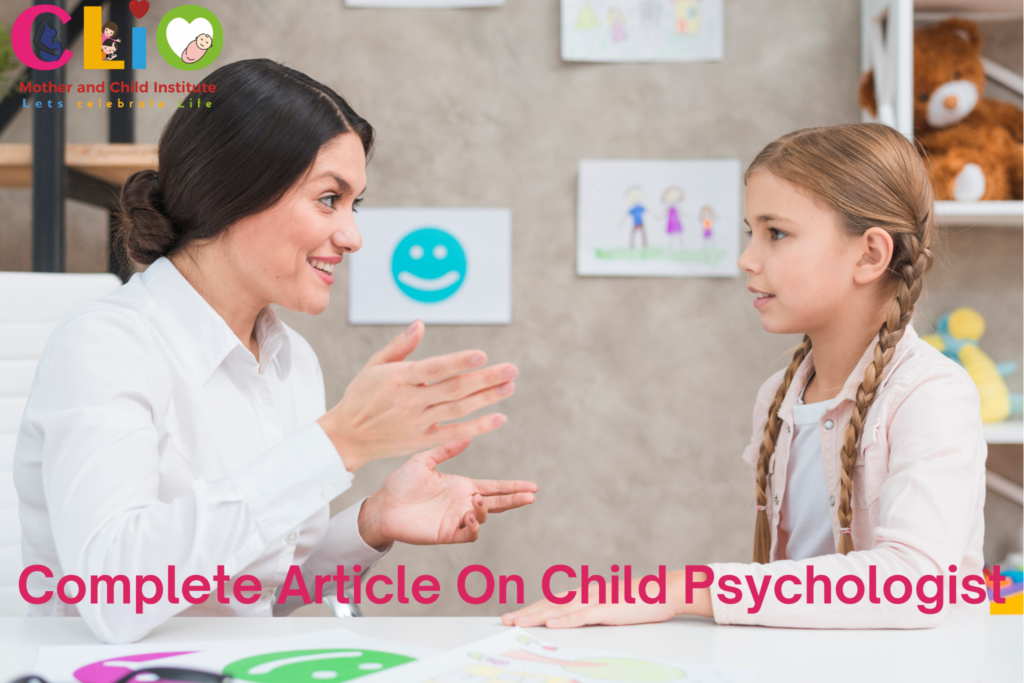Understanding your child’s growth is a fulfilling aspect of parenting. Observing their unique perspectives, guiding them through learning new skills, and supporting them through emotional changes are key parental roles. However, this journey isn’t without challenges.
As children develop from infancy to adulthood, they traverse distinct developmental phases influenced by their environment, genetics, and culture. Explaining their experiences or comprehending their emotions can be tough for children. Child psychology becomes invaluable, providing crucial insights into their mental, physical, cognitive, and emotional well-being throughout their development.
What is a child psychologist?
A child psychologist is a trained professional equipped with clinical expertise to assess and address the mental, emotional, social, and behavioral well-being of infants, young children, and adolescents. They possess comprehensive knowledge of children’s psychological requirements, acknowledging the impact of family dynamics and social environments on:
- Social and emotional acclimatization.
- Developmental growth.
- Behavioral adjustments.
Furthermore, child psychologists specialize in understanding mental and behavioral disorders that affect children.
What do child psychologists do?
Child psychology is a specialized field within psychology that utilizes scientific insights to provide psychological support to infants, toddlers, children, and adolescents within their social environments. This specialization holds significance due to the challenges children face in expressing their experiences and comprehending their emotions. For parents or guardians, distinguishing between typical developmental behaviors and potential abnormalities in a child’s conduct poses a similarly challenging task.
Child psychologists specialize in facilitating the distinction. They hold expertise in the fundamental psychological requirements of children and recognize the impact of family and social environments on their growth. Their focus revolves around three core domains:
- Physical development encompasses the typical advancement of a child’s physical capabilities, including milestones such as lifting their head, rolling over, crawling, and ultimately, walking and running. Child psychologists work in conjunction with pediatricians to evaluate a child’s physical maturation. Identifying significant delays in physical development can sometimes reveal underlying issues, enabling early intervention and assistance.
- Cognitive development involves a child’s intellectual learning and thought processes, encompassing areas like language acquisition, memory, decision-making, problem-solving, and the utilization of imagination. These factors collectively reflect both the genetic predispositions and environmental influences on a child’s cognitive growth.
- Emotional development revolves around a child’s ability to perceive, comprehend, and articulate their emotions. In the early stages, it primarily involves basic feelings like joy, anger, sadness, and fear, closely intertwined with social growth. As children mature, more intricate emotions such as guilt, confidence, hope, and pride emerge. Assisting children in grasping their emotions can significantly influence their overall development and enhance their relationship skills in the future.
Child psychologists educate children on crucial coping skills to navigate their emotions during various developmental stages. Their expertise lies in the early detection of anomalies and identifying the origins of common behavioral challenges. Additionally, they support children in addressing and overcoming early childhood traumas.
Where do child psychologists work?
Child psychologists work within diverse settings, such as schools, community health centers, hospitals, research facilities, and private practices. They commonly conduct sessions in their dedicated offices, engaging with patients either face-to-face or through virtual means. While some work independently, others collaborate within a team framework. Even when conducting individual assessments and consultations, they frequently provide progress reports to parents, educators, medical professionals, or legal entities as needed.
What skills do child psychologists need?
Child psychologists necessitate a distinct fusion of both technical proficiency and emotional intelligence in their profession. Alongside the requisite technical expertise and procedures, a strong emphasis is placed on emotional intelligence.
Essential skills for child psychologists encompass various areas:
- Conducting assessments encompassing psychological, intellectual, cognitive, and behavioral testing and evaluation.
- Implementing interventions like psychotherapy and behavior management.
- Creating prevention programs focused on areas such as bullying, addictions, teen pregnancy, and obesity.
- Collaborating and consulting with other professionals engaged in child-related fields.
- Crafting and utilizing research methodologies.
Apart from these competencies, top-tier child psychologists frequently exhibit the following attributes:
- Proficiency in verbal and written communication
- Trustworthiness
- Empathetic demeanor
- Strong problem-solving skills
- Enthusiastic approach
How to become a child psychologist
While some opportunities exist in child psychology for individuals holding a master’s degree, most clinical positions mandate candidates to have attained a doctoral-level education. Our analysis using real-time job data from over 8,000 clinical psychologist job postings indicated that 86 percent of employers specifically sought candidates with a doctoral degree.
For psychologists practicing clinically, proper licensure is a mandatory requirement. Licensing prerequisites vary based on state regulations and the nature of the role, yet most clinical and counseling positions necessitate a psychology doctorate, completion of an internship, and one to two years of supervised professional experience.
To become a child psychologist, passing the Examination for Professional Practice in Psychology (EPPP) is essential. Many states also mandate a jurisprudence exam to assess comprehension of state laws relevant to practicing psychology. Child psychologists must engage in continuing education courses to uphold their licensure.


